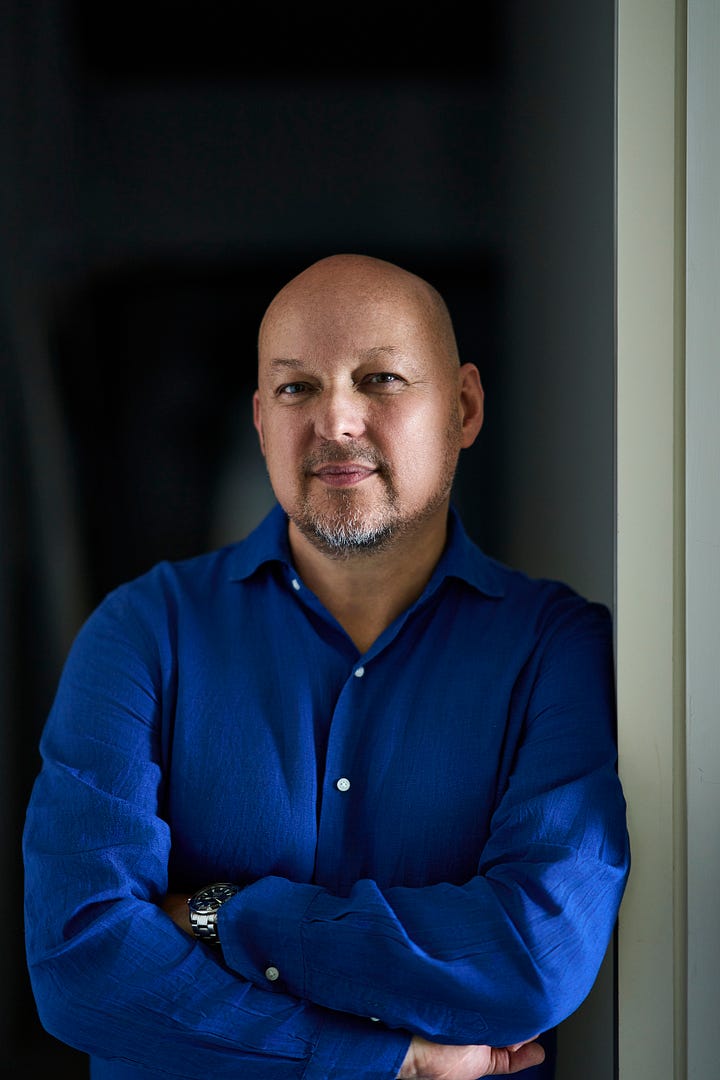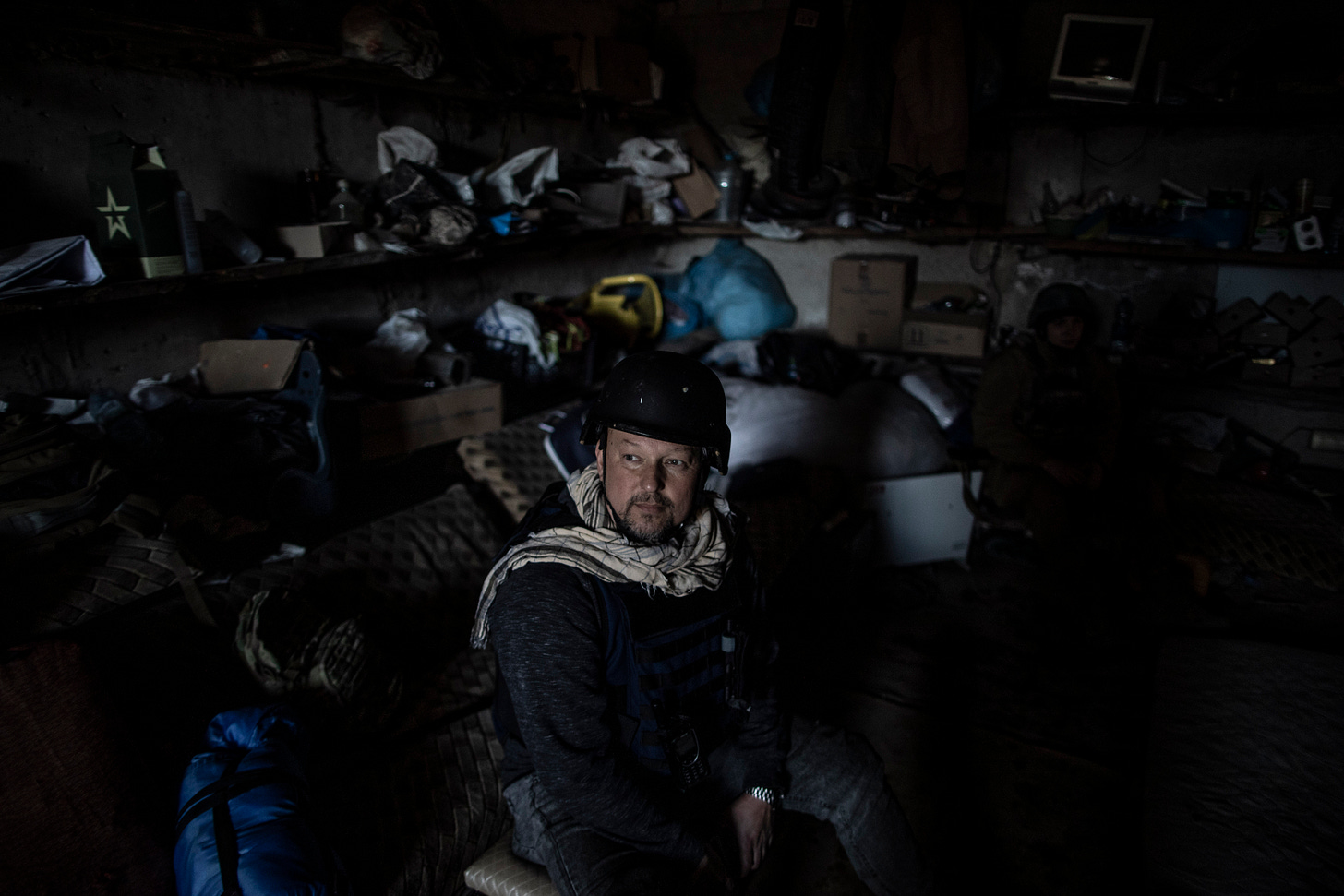Stalin’s long shadow
Author and journalist Yaroslav Trofimov discusses how historical memory informs Ukraine’s defiance of Putin
Yaroslav Trofimov reporting in Ruska Lozova, a village in eastern Ukraine, in May 2022, three months into Russia’s full-scale invasion. (c. Manu Brabo)
The reappearance of Russian soldiers on Ukrainian soil in 2014 after a more than 20-year absence pulled Yaroslav Trofimov into his grandmother’s past. Debora Rosenberg had endured Ukraine’s darkest epoch under the Soviet Union, when her homeland lost at least 15 million people during the murderous, three-decade reign of Joseph Stalin, who rose to power in 1924.
In the 1930s, Stalin decimated Ukraine’s countryside by engineering a manmade famine and ravaged its cities by ordering mass purges of artists, intellectuals and other perceived enemies of the state. After Germany invaded Ukraine in 1941, he conscripted millions of Ukrainians into the Red Army, sacrificing their lives in forced service to Moscow. Following the Nazi surrender in 1945, he dispatched his security forces to western Ukraine to crush a partisan insurgency that sought to establish an independent Ukrainian nation. The state campaign of extermination and deportation depopulated entire villages, continuing beyond Stalin’s death in 1953.
Debora survived the blood-soaked horror and lived long enough to witness Ukraine gain its freedom after the Soviet Union imploded in 1991. Less than a quarter-century later, Vladimir Putin renewed Russia’s long history of military violence against its neighbor, sending troops into Crimea and southeastern Ukraine in 2014. The incursion moved Trofimov, the longtime chief foreign affairs correspondent for the Wall Street Journal, to begin writing “No Country for Love.” Published earlier this year in the United States by Abacus Books, the novel draws from his late grandmother’s life to create an elegiac, generational portrait of a country and people racked by Stalinism, Nazism and the slow death of hope.
Trofimov, 55, finished his manuscript in late 2021. Weeks later, he returned to his native Kyiv as Russia launched its full-scale invasion, watching with a mix of rage and disbelief as the tragic past depicted in “No Country for Love” burst forth into the present. “The very same neighborhoods that I described in the novel were being bombarded again,” he told me. “That was a very discomforting feeling.”
Given the parallels between then and now, I wanted to ask Trofimov about the power of historical memory, Ukraine’s fight for liberty in Stalin’s time and how that prior struggle has shaped the country’s resistance to Putin. Our conversation has been edited for clarity and length.
Your book covers a particularly brutal period in Ukraine’s history. How aware are Ukrainians of the collective trauma of previous generations?
As harrowing and complicated as my grandmother’s life was, her story is not that unusual for Ukraine. Just look at the numbers. Some 4 million Ukrainians died in the artificial famine. Then there was the wholesale execution of artists, painters, writers — the entire elite. Then there was the Holocaust, the war and post-war insurgency. All in all, about 15 million people died, and Ukraine only had 28 million people before all of that began.
Everyone in Ukraine today is descended from people — their grandparents, great-grandparents, great-great grandparents — who were carrying very similar stories. So this dark past was always there hanging in the air in every Ukrainian kitchen and dining room, and that permeates the national identity.
How does historical memory factor into the country’s refusal to bow to Moscow despite tens of thousands of Ukrainian soldiers and civilians killed?
People outside Ukraine are very puzzled: “Why do you keep fighting? Why do Ukrainians after three years keep going through these battles, casualties, destruction of cities?” The answer is because Ukraine’s past bears very heavily on the present. This idea of “never again” drives the resistance because the consensus is that even though it’s bloody and difficult now, the alternative — surrender — will bring more death and more destruction. Ukrainians know how Russia behaved the last time they were in charge, and they can read what the Russian official media and Russian government are saying about their plans for Ukraine should they win again. It’s nothing short of genocidal.
Putin has long dismissed Ukraine’s nationhood and spoken of the need to “denazify” the country. Going back to Russia’s initial incursion in 2014, many Western reporters and commentators amplified the Kremlin’s distortions about far-right militias and political parties in Ukraine. What was your reaction?
Let’s just start with the fact that these far-right parties have never gotten more than 1 percent of the vote in Ukrainian elections and have never been within any distance of actual power. So they don’t have much support among the general public.
To understand the present, it’s fundamental to understand Ukrainian history. When I started writing this book in 2014, I was flabbergasted by how little understood Ukraine was: its history, its people, its struggle, its resistance. I wanted to explain this very complex, contradictory history [because] everything that was known about it was known through Russia’s eyes, or through people who had their Russian studies degrees or who used to be diplomats or journalists in Moscow. I was shocked by how this traditional Soviet vision of Ukraine — of Ukrainian nationalism as a neo-Nazi plot — was bought wholesale by so many people in the West who should know better.


“No Country for Love” (Abacus Books; 384 pages) draws from the life of Yaroslav Trofimov’s late grandmother. (Photo of Trofimov by Sebastian Boettcher.)
Putin has recycled and updated Soviet propaganda that disparaged Ukraine’s independence movement in the Stalin era. But it is true that elements within the Ukrainian Insurgent Army committed civilian atrocities in seeking to create a sovereign nation. Can you explain why the army is revered in Ukraine?
If you look at the history of Ukrainian nationalism in the early and mid-20th century, Ukraine is different from Russia because it looked west. And almost all the nationalism movements in Europe at the time were fascist and ethnic and, very often, antisemitic. Those were the Western values of the day, unfortunately, and Ukraine was not spared that. And, yes, these insurgents did commit massacres against Jews, Poles and others.
However, they were also fighting against foreign occupation during the war when Ukraine was caught between two totalitarian regimes — they were fighting against the Germans and against the Soviets. After the war, they were fighting against the annihilation of their villages and cities by the Soviets, who were carrying out a genocidal policy [of Russification] in the 1950s. So when Ukrainians who are fighting the Russians today sometimes wave the red and black flag of that resistance army of the 1940s and ’50s, they are not waving it because they are antisemitic or they want to slaughter the Poles. They’re waving it because that was the last time someone successfully was fighting the Russians — who are invading Ukraine again.
To what extent does that previous crusade for independence inform the country’s reluctance to agree to Putin’s call for a “neutral” Ukraine?
The lesson of the World War II insurgency is that the Russians are very good at quashing insurgencies because, unlike the U.S. in Iraq and Afghanistan, they don’t mind killing millions to achieve their goals. We’ve seen that throughout Russian history, starting with the genocide of the Circassians in the Caucasus in the 19th century.
If there’s a ceasefire or peace deal, Ukrainians know that it’s just a prelude to another [Russian invasion]. Ukraine’s survival lies in the survival of the state and the army — a very strong army that can defend itself. What Ukraine has now — what it won in 1991 — is the ability to decide its own fate and to have its own army, which is the guarantor of independence. It was the Ukrainian army, without much outside help, that repelled the initial Russian attack in 2022, that won the battle of Kyiv and ensured Ukraine remained independent. So that is the lesson of the past: statehood is everything.
Russia occupies around 20 percent of Ukrainian territory, including Crimea. Considering Moscow’s advantages in troop strength and firepower, are there concessions to which Ukraine would agree to bring an end to the bloodshed?
There’s a realization in Ukraine that regaining the lost lands by military force is not going to happen in the immediate future. The front lines are static and the prospect of liberating Crimea is not imminent. So there is a newfound, let’s say, recognition of reality. It doesn’t mean Ukraine will sign away these lands but will perhaps accept an armistice along those lines.
What is not negotiable is what happens to the rest of Ukraine. Russia continues to demand demilitarization — cutting the Ukrainian army by 90 percent or more, banning Ukraine from having long-range weapons or much of any other weapons and basically making it defenseless for the next Russian war. I think that’s where the greatest risk is for peace talks. Because if at some point the U.S. embraces those Russian demands, the Ukrainians will have to say no because they will not sign a suicide pact.
I don’t like thinking about this possibility, but what happens if Kyiv falls?
The Russians won’t stop if they get Ukraine. The pattern of Russian imperialism has always been to use the resources of the conquered nations to keep going. So if, God forbid, the Russians occupy [all of] Ukraine, they will draft every fighting-age Ukrainian to fight the next war.
Etc.
— “No Country for Love” spans from 1930 to 1954 in tracing the life of its protagonist, Debora Rosenbaum, as she tries to make sense of and survive Ukraine’s deep, prolonged suffering. In a review, The Economist observed that the book “does a service both to the victims of those terrible historical events and to the Ukrainians who are fighting against Russia now to preserve their country’s freedom.” Trofimov’s debut novel follows last year’s publication of “Our Enemies Will Vanish,” his nonfiction account of the first 12 months of Putin’s war that was named a finalist for the Orwell Prize for political writing.
— On the topic of Ukraine’s suffering, last week a Russian missile struck a playground in Kryvyi Rih, a city in central Ukraine and President Volodymyr Zelensky’s hometown. The attack killed 19 people, including nine children; the victims ranged in age from 3 to 79. A wrenching story in The New York Times on the aftermath captured the ever-growing toll of Putin’s war. Meanwhile, U.S. President Donald Trump keeps golfing.
— Many thanks for reading. If you’re a paid subscriber, please share your thoughts below in the comments. And if you’re not, I hope you’ll consider upgrading — paid subscriptions make this newsletter possible. You can also support my self-funded reporting here. And remember to connect with me on Bluesky. Thank you.


